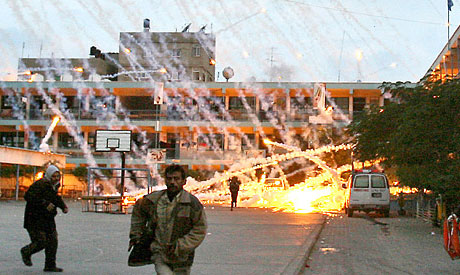
Israeli War on Gaza December, 2008
It's barely five months since Ismail Abu Bleemah, 49, returned to his home east of Sharq al-Balah in the middle of the Gaza Strip. He and his family abandoned their home two years ago in the aftermath of the violent Israeli offensive. Even now he is considering renting an apartment somewhere else.
Ismail's house is close to the border with Israel and he and his family narrowly escaped when Israel launched its war on the Strip on December 27, 2008 when missiles rained down in the vicinity of their home.
"Israel's repeated talk about the possibility of launching a new war on the Strip worries me a lot and I am searching in earnest for an apartment deep in the Gaza Strip, far from the border area," Ismail told Ahram Online.
On this, the second anniversary of the war, many Palestinians express their fear that Israel will launch a new war in the face of clear escalation by Tel Aviv.
The chief of general staff in the Israeli army, Gaby Ashkenazi, has announced that he has issued instructions to target Hamas' rank and file for the first time since the last war ended, claiming that Hamas no longer only turned a blind eye to the small groups launching missiles and rockets, but that in some instances it supports them.
Ashkenazi added that there are Israeli intelligence agencies which view the military wing of Hamas as "Brigades of Ezz Eddin El-Qassam" participating in rocket attacks.
Israel isn't hiding its unease with what is happening in the Gaza Strip, especially in light of the lessons it learned in the second Lebanese war and the last one on Gaza. Tel Aviv is committed to making it impossible for Hamas to procure rockets that can reach Israeli towns and infrastructure.
Such a strategic shift would threaten to alter the balance of power between the two sides. In the case of Hamas obtaining such rockets to use against Israeli targets, Israel will respond with a decisive blow.
The chief of the Knesset committee on foreign affairs and security, Shaoul Moufaz, threatened that should Hamas launch long range rockets into the heart of Israel, Israel will immediately act to bring down its rule.
Israel will launch a large scale military campaign on the Gaza Strip should the small movements carry out operations targeting settlers. Israeli officials are keen to say that they will not acknowledge the Goldstone report when they decide whether to launch a large military operation against the Gaza Strip, hitting it with all the force they deem appropriate.
But what worries Israeli military elites is the fact that a study conducted by the Staff of the Israeli army proved beyond any doubt that the last war on Gaza harmed Israel.
As the study put it, whereas the second war on Lebanon can be viewed as a technical failure and strategic victory, the war on Gaza was a technical victory but strategic failure. As a consequence, there is a fierce debate within Israel about the repercussions of any decision to launch a new war on Gaza.
As for the Palestinians, the anniversary of the war coincides with several negative indicators and after two years it doesn't seem that they have learned the necessary lessons.
There is no coordination between the disparate factions and, more worryingly, they are not controlled by a single strategy with many of the rocket launches intended to embarrass Hamas and push it into an early confrontation with Israel.
The factions are aware that Israel long ago decided to respond to any operation by targeting Hamas, as it pulls the levers in the territory.
It is obvious that the damage inflicted by the rocket attacks on the settlements is minimal with most of them landing in empty spaces. But Hamas suffers from confusion. Dr. Mahmoud al-Zahar, a member of its political office, announced the movement's commitment to the truce with the occupation while the military arm is opposed to it.
The writer and Palestinian political analyst, Nehad Khalil, sees the Palestinian reality on the second anniversary as painful.
"There must be a clear and united strategy for the Palestinian factions on the question of armed action, especially as it concerns a very sensitive issue with many serious consequences," Khalil told Ahram Online.
Despite the Israeli military leadership's conclusions on the last war, Israel won't hesitate to launch a new war on the territory if it believes the Palestinians have crossed a red line.
Short link: